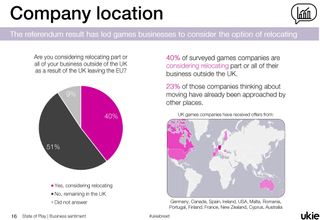40 percent of UK game companies consider relocating in wake of Brexit
New UKIE study says 23 percent of those thinking of moving have been approached by other places.

In the immediate aftermath of Britain's 2016 referendum result, reports suggested PC gaming could become a more expensive endeavour in the wake of Brexit. A UK-wide survey carried out by trade body UKIE has now found that 40 percent of observed game companies are "considering moving part or all of their business outside the UK", and that 23 percent of those companies have been approached by other places.
Across 11 cities, UKIE's survey confidentially evaluated 75 videogames organisations, with the trade body also arranging roundtable meetings with over 70 games-related businesses up and down the UK. Of those companies, 61 percent of respondents said they "relied on highly skilled international talent", and 57 percent employ workers from the EU.

As such, the report suggests there is an "urgent" need for the UK government to clarify the status of EU citizens currently working in Britain and to ascertain whether those workers have the right to remain in the UK post-Brexit. To this end, 98.4 percent of respondents believe EU nationals with the appropriate skills and qualifications relevant to the games industry should have a "blanket right to live in the UK."
As per UKIE's latest market evaluation, consumer spend in the UK games market hit £4.33bn last year, up 1.2 percent from 2015. There are over 2,000 game companies in operation in the UK, with 12,100 employees, and the UK games market is said to be the sixth largest in the world against global consumer revenues.
Within the report, case studies are provided by Bossa Studios' (I Am Bread, Surgeon Simulator) Henrique Olifiers, and The Chinese Room's (Dear Esther, Everybody's Gone to the Rapture) Dan Pinchbeck.
"The damaging uncertainty caused by Brexit to our EU employees," says Olifiers, "and not having open access to the brightest and best European talent, some of whom are now refusing to resettle in the UK, is forcing us to have to assess whether it will be at all possible to produce our future games in this country."
"We should be doing everything we can to call for continued inclusion in such programmes post-Brexit," says Pinchbeck, "or for our government to provide alternative support for our world-class media industry."
Comic deals, prizes and latest news
Sign up to get the best content of the week, and great gaming deals, as picked by the editors.
Thanks, The Guardian.
Most Popular





